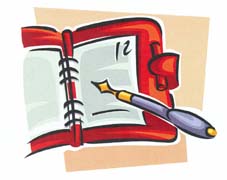Motivation
Based on:
Silva, Paul J. (2007). How
to write a lot: A practical guide to productive academic writing.
Washington, DC: American Psychological Association.
Monitoring Progress
Setting
a goal is just the beginning of being a successful writer. People
who are successful at something monitor their progress – saving
money, losing weight, training for a marathon, or selling cookies.
“Most people have no idea how much – or how little – they're
writing. Because they view themselves in a flattering,
self-enhancing light, most people think that they're writing more
often and more efficiently than they are. To write a lot, you need
to take a cold, accurate look at your writing progress” (pg. 39).
Besides
seeing the reality of your effort, monitoring your progress can also
be very motivating. Writing down your progress at each writing
session helps keep your focus on the project. Monitoring your own
behavior, research had shown, produces the desired behaviors – in
other words – the desire to write down progress encourages
progress. Financial planners and diet gurus play to this desire. To
get control of spending, the spendee has to write down everything
they purchase, or the dieter writes down every bite they take.
Having to write down the details encourages more thoughtful spending
or eating. Writing down your sessions encourages increased time and
more productive work.
Silvia
uses a spreadsheet format with columns for date, session goal, word
count, and a check for met/unmet goals. However, a notebook or chart
on the wall would work just as well. It is the visual cue that is
most important. If you like playing with numbers, you can then
figure out the average words per day or percentage of session goals
met. Then, try to increase that percentage each month.
Reward Yourself
B.F.
Skinner studied reward behaviors in people. It is clear that
self-reinforcement and reward is highly motivating. You might
consider setting a reward when you set your large writing goals. For
session goals, it may be something smaller – a a 2-minutes
mediation, a “Risky Business” like dance and singing, or a cup of
Earl Grey tea. By generating a feeling of accomplishment for reaching
goals, you're more likely to want to succeed more often. But, do
NOT reward yourself with skipping a writing session. That is like
rewarding yourself for quitting smoking with having a cigarette!
Writer's Block
Silvia
believes that in academic writing, there is no such thing as writer's
block. The narratives academics craft do not (in many cases)
resemble the figurative, flowery stuff of fiction and poetry.
“Writer's block is nothing more than the behavior of not writing”
( p. 46). Writing on a schedule, with specific goals, should take
care of this. However, if you need some suggestions on how to put
pen to paper or fingers to keyboard, read the article linked below (a short summary is provided):
- Write about something
else
- Write about a picture
- Keep a journal
- Make an outline
- Read
- Take a break
- Establish a writing habit
- Listen to non-lyrical
music
- Research
- Ask others for ideas
Prioritizing
It is very easy to get distracted by
non-important but fun items on your to-do list. Stephen Covey, in
Seven Habits of Highly Effective People proposed four
quadrants of activity management to help people organize and
prioritize the things they need to do. To often, we spend most of
our time in the Urgent/Important square because we don't have a clear
picture of our overall goals, projects and deadlines. Then,
deadlines creep up and it become Urgent/Important and we rush to get
it done. Those of us who procrastinate tend to locate ourselves in
the Not Urgent/Not Important quadrant – choosing to do things that
are immediately pleasurable, but don’t advance our goals or
projects. You might consider using this graphic organizer as another
way to think about your weekly writing and grad school roles –
which will allow you to see both the urgent and the important tasks
during the week.

Instead of reading Stephen Covey's book, I would recommend his son's adaptation of the ideas for teenagers, The 7 Habits of Highly Effective Teens
by Sean Covey. It is shorter, illustrated, and less dry than the original. Or, check out some of the interpretations of Covey's ideas below:
Another helpful hint that I have heard from
#phdchat is to have a list of things that should get done, but don't require intense concentration. For example, renaming and organizing files, deleting old emails, or skimming articles to see if they would be useful. These activities can be saved for the times that your energy and concentration is low. In addition, have a file of work that is always with you for the times that you find you are unexpected waiting (at the doctor's office, for your car etc.). The most effective and efficient academics plan ahead and use even the smallest chunks of time, like the 15 minutes in-between conference sessions or the time waiting for a late appointment.










